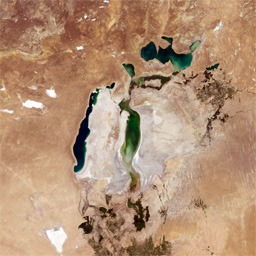BAKU (Trend) — A summit of heads of the states that founded the International Fund for Saving the Aral Sea (IFAS) is scheduled to be held on Aug. 24 in the Turkmen resort of Avaza, Altyn Asyr TV channel reported. Turkmenistan is the chairman of the IFAS.

- The Aral Sea
- From space, North at top, August 2017.
A concept has been formed, which includes the adoption of a new program of action for provision of assistance to the countries of the Aral Sea basin, the implementation of a regional action plan for environmental protection as a single environmental program of the Central Asian countries.
The ecosystems of the Aral Sea and the river deltas feeding into it have been nearly destroyed, not least because of the much higher salinity. The receding sea has left huge plains covered with salt and toxic chemicals resulting from weapons testing, industrial projects, and pesticides and fertilizer runoff. These substances form wind-borne toxic dust that spreads throughout the region.
As a result, the land around the Aral Sea is heavily polluted, and the people living in the area are suffering from a lack of fresh water and health problems, including high rates of certain forms of cancer and lung diseases. Respiratory illnesses, including tuberculosis (most of which is drug resistant) and cancer, digestive disorders, anaemia, and infectious diseases are common ailments in the region. Liver, kidney, and eye problems can also be attributed to the toxic dust storms.
All of this has resulted in an unusually high fatality rate among vulnerable parts of the population: the child mortality rate is 75 in every 1,000 newborns, and maternity death is 12 in every 1,000 women. The dust storms also contribute to water shortages through salt deposition.
The overuse of pesticides on crops to preserve yields has made this worse, with pesticide use far beyond health limits. Crops in the region are destroyed by salt being deposited onto the land, and fields are being flushed with water at least four times per day to try to remove the salinity from the soils. The dust storms make regional winters colder, and summers hotter.
Established in the 1990s by Kazakhstan, Kyrgyzstan, Tajikistan, Turkmenistan and Uzbekistan, IFAS aims to finance joint projects and programs to save the Aral Sea and improve the environmental situation in the Aral Sea region.
IFAS was granted an observer status in the UN General Assembly in December 2008. Ashgabat put forward earlier an initiative to develop a special UN program for the Aral Sea.

